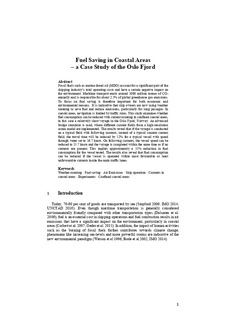Fuel Saving in Coastal Areas: A Case Study of the Oslo Fjord
Chapter
Accepted version

View/
Date
2018Metadata
Show full item recordCollections
- Institutt for IKT og realfag [555]
- Publikasjoner fra CRIStin - NTNU [37219]
Original version
Fuel Saving in Coastal Areas: A Case Study of the Oslo Fjord. In: Ölçer A., Kitada M., Dalaklis D., Ballini F. (eds) Trends and Challenges in Maritime Energy Management. WMU Studies in Maritime Affairs, vol 6. https://doi.org/10.1007/978-3-319-74576-3_18Abstract
Fossil fuels such as marine diesel oil (MDO) account for a significant part of the shipping industry’s total operating costs and have a certain negative impact on the environment. Maritime transport emits around 1000 million tonnes of CO2 annually and is responsible for about 2.5% of global greenhouse gas emissions. To focus on fuel saving is therefore important for both economic and environmental reasons. It is indicative that ship owners are now using weather routeing to save fuel and reduce emissions, particularly on long passages. In coastal areas, navigation is limited by traffic rules. This study examines whether fuel consumption can be reduced with current routeing in confined coastal areas, in this case a relatively short voyage in the Oslo Fjord, Norway. An advanced bridge simulator is used, where different current fields from a high-resolution ocean model are implemented. The results reveal that if the voyage is conducted on a typical field with following currents, instead of a typical counter current field, the travel time will be reduced by 12% for a typical vessel with speed through water set to 16.7 knots. On following currents, the vessel speed can be reduced to 15.7 knots and the voyage is completed within the same time as if no currents are present. This implies approximately a 15% reduction in fuel consumption for the vessel tested. The results also reveal that fuel consumption can be reduced if the vessel is operated within most favourable or least unfavourable currents inside the main traffic lanes.